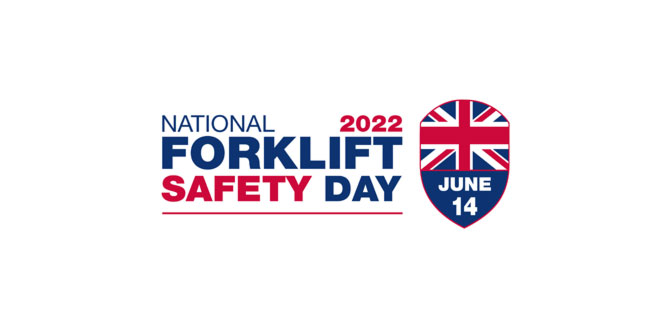
As part of its continuing commitment to raising safety standards across the material handling sector, the UK Material Handling Association (UKMHA) - the UK trade association for manufacturers, truck users and suppliers of forklift trucks and associated components and services – is once again championing the cause of National Forklift Safety Day.
Each year, the campaign, which this year takes place on Tuesday 14th June, highlights a different safety issue, with the topic for 2022 being Operator Training and Supervision. The intention is to reduce the number of workplace accidents in which people are killed or seriously injured after being struck by a moving vehicle.
According to Health & Safety Executive figures , ‘Struck by a moving vehicle’ was the second most common cause of workplace fatality in 2020/21, accounting for 25 deaths – 18% of the total number of workplace fatalities across the year. The data does not break down the type of vehicles involved, but each year there are fatalities and serious injuries involving forklift trucks, accidents which in some instances could have been avoided if staff had been properly trained and adhered to safe systems of work.
David Goss, Technical Director, UKMHA said: “Nobody should operate a forklift truck, even on a very occasional basis, if they have not received the appropriate training. Employers are required to provide training for all lift-truck operators they employ, and to ensure that anyone operating workplace transport on their sites is fully competent.”
The law is clear on the issue. Employers have a general duty under Section 2 of the Health and Safety at Work etc. Act 1974 and under The Management of Health and Safety at Work Regulations 1999 to provide information, instruction, training, and supervision to ensure the health and safety of their employees.
Also, Regulation 9 of The Provision and Use of Work Equipment Regulations 1998 (PUWER), requires employers to ensure that all persons who use work equipment (including forklift trucks) have received adequate training for purposes of health and safety, including training in the methods which may be adopted when using the work equipment, any risks which such use may entail, and precautions to be taken.
Sites operating forklift trucks, or other lifting equipment, are required to comply with The Lifting Operations and Lifting Equipment Regulations 1998 (LOLER). This requires lifting operations to be planned and supervised by suitably competent persons. For many day-to-day operations, the operator may plan the lift, therefore, they should have the appropriate training, knowledge and expertise before carrying out the task. For unusual and complex tasks or situations, specific risk assessments and planning are likely to be required.
“Failing to adhere to Health & Safety regulations can land employers in serious trouble, often resulting in heavy fines and criminal convictions should an incident result in a serious accident or a fatality,” added Mr Goss.
“Employers have a duty of care to their staff to ensure they are properly trained for the tasks they are expected to carry out during the course of their work. Due to the nature of work, lifting requirements evolve over time, therefore, ongoing and refresher training should be provided to ensure members of staff are always fully versed in the requirements of their role.”
The advice of the UKMHA is that employers should always use accredited providers to deliver the necessary forklift training. There are a number of organisations which provide accreditation for lift-truck training schemes, and they are represented by Accrediting Bodies Association for Workplace Transport (ABA).
This year’s National Forklift Safety Day campaign is being delivered online and UKMHA is urging the entire material handing sector to support the move as part of its ongoing drive to improve safety standards across the industry.
Full details of the campaign can be found by visiting the National Forklift Safety Day website - www.nationalforkliftsafetyday.co.uk/get-involved – where a new eBook – Operator Training - specially prepared for this year’s campaign is freely available to download. The book contains a wealth of information about operator training, including legal requirements and an Approved Code of Practice. NFSD will be supported by a full social media campaign which people can follow on LinkedIn, Twitter and Facebook, and post their own stories using #NationalForkliftSafetyDay
UKMHA will revisit the theme of the campaign throughout the year and will highlight the important message again during this autumn’s Safety Convention.
Previously known as the FLTA National Forklift Safety Convention, the UKMHA Safety Convention is the most authoritative event of its kind in the material handling calendar. It will see hundreds of managers, from across the UK, come together to share best practice advice.
Tim Waples, CEO, UKMHA said: “Collectively, Safety Convention delegates are responsible for the lives of thousands of workers across the UK. To ensure they fulfil their duty of care, it is crucial they have the most up to date, practical and valuable information available.
“This is why UKMHA is proud to be delivering National Forklift Safety Day for 2022 and beyond. The campaign provides an opportunity for everyone to promote a safer material handling industry and to propagate best practice across the sector. We hope the entire industry will unite behind the cause and spread the important message as widely as possible.”
The UK Material Handling Association (UKMHA) is a not-for-profit organisation representing all aspects of the UK’s material handling industry, including manufacturers, suppliers and dealers.
Virtually all manufactured goods and commodities are moved by material handling equipment at some point in their journey from factory to end user. The material handling industry therefore plays a pivotal role in the UK economy and is almost unique in the way it operates across all industries, keeping the UK moving.
The UKMHA has been formed by the merger of the industry’s two most respected trade associations – the British Industrial Truck Association (BITA) and the Fork Lift Truck Association (FLTA), together with their co-owned subsidiary, Consolidated Fork Truck Services (CFTS).